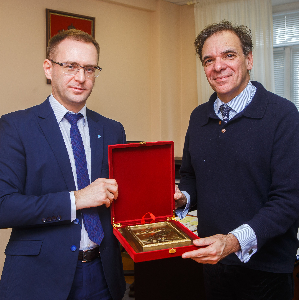On Wednesday, February 13,
Pascal Cauchy, Attache for University Cooperation of the Embassy of France in Russia, has visited Samara University. He gave a lecture to students about the modern history of France and met with Acting Rector
Vladimir Bogatyrev.
Addressing Cauchy Pascal, Vladimir Bogatyrev noted that the visit of the French Attache is a great honor for the university. Cauchy Pascal thanked the university administration for the warm welcome and the opportunity to talk to students. The French Attache teaches at Paris Institute of Political Studies (Sciences Po) and it is very important for him to give a lecture at a Russian university.
During the working meeting, Cauchy Pascal proposed Samara University to develop joint research projects, double degree programmes, double doctoral (PhD) degree programmes, stressing that this interaction is very important for France.
Vladimir Bogatyrev noted that Samara University presents a whole range of training areas – being a multidisciplinary scientific and educational centre with a pronounced aerospace core, it conducts current research on the socio-humanitarian, natural science, economic, law areas of training and science. And the university is ready to cooperate with the scientific and educational centers of France in all these areas.
The Acting Rector also spoke about the current cooperation of Samara University with scientific and educational centres of France. So, between the university and the University of Technology Troyes, Price Induction Anglet, ISAE Supaero, and Université Grenoble Alpes, there are student, faculty, and employee exchange programmes, joint research and educational programmes are being implemented. The university actively collaborates with the Institut Polytechnique des Sciences Avancees (IPSA). This is the leading private university in France in the field of engineering training for the aviation, rocket and space industry. The universities implement a double degree programme. In 2018, firstly in Samara, and later in Toulouse, a joint project was held within this programme for students of the Institute of Engines and Power Plants (IDEU) of Samara University and IPSA. For two semesters, French master’s degree students designed structures and explored the processes in a three-shaft turbojet high-thrust engine.
In addition, the university conducts joint scientific research with the École nationale supérieure des mines de Saint-Étienne and with the Université de Technologie Compiègne. Vladimir Bogatyrev also noted: Samara University conducts a number of international summer schools that are popular with students and scientists from foreign scientific and educational centres. French students are interested in the summer school “Space Technologies and Experiments in Space”. In a few weeks its students, under the guidance of teachers, pass through the way to the creation of a nanosatellite – from the idea of a mission to the construction of a spacecraft. In addition, the university collaborates with the Institute of Aeronautics and Space Research ISAE, participates and takes first prizes in the annual competition of the National Centre for Space Studies (CNES) for successful launches of experimental models of rockets.
At the end of the meeting, Vladimir Bogatyrev presented Cauchy Pascal a souvenir with the symbols of the university and the image of the small “AIST-2D” spacecraft. The small spacecraft was developed by the scientists of Samara University and specialists of the JSC SRC “Progress” and is now working in orbit as part of the grouping of small spacecrafts of "AIST" series. It is designed for remote sensing of the Earth, scientific experiments. In August 2018, “AIST-2D” filmed more than 30 million square kilometres of land, of which – 11 million square kilometres of the territory of Russia.
